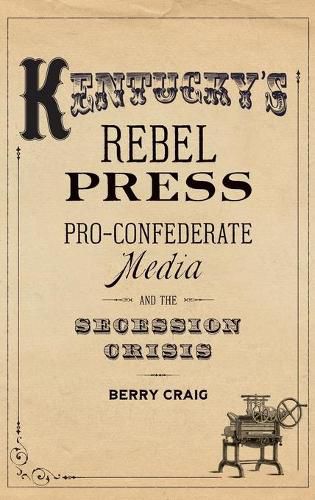Readings Newsletter
Become a Readings Member to make your shopping experience even easier.
Sign in or sign up for free!
You’re not far away from qualifying for FREE standard shipping within Australia
You’ve qualified for FREE standard shipping within Australia
The cart is loading…






This title is printed to order. This book may have been self-published. If so, we cannot guarantee the quality of the content. In the main most books will have gone through the editing process however some may not. We therefore suggest that you be aware of this before ordering this book. If in doubt check either the author or publisher’s details as we are unable to accept any returns unless they are faulty. Please contact us if you have any questions.
Throughout the Civil War, the influence of the popular press and its skillful use of propaganda was extremely significant in Kentucky. Union and Confederate sympathizers were scattered throughout the border slave state, and in 1860, at least twenty-eight of the commonwealth’s approximately sixty newspapers were pro-Confederate, making the secessionist cause seem stronger in Kentucky than it was in reality. In addition, the impact of these rebel presses reached beyond the region to readers throughout the nation. In this compelling and timely study, Berry Craig analyzes the media’s role in both reflecting and shaping public opinion during a critical time in US history. Craig begins by investigating the 1860 secession crisis, which occurred at a time when most Kentuckians considered themselves ardent Unionists in support of the state’s political hero, Henry Clay. But as secessionist arguments were amplified throughout the country, so were the voices of pro-Confederate journalists in the state. By January 1861, the Hickman Courier, Columbus Crescent, and Henderson Reporter steadfastly called for Kentucky to secede from the Union. Kentucky’s Rebel Press also showcases journalists who supported the Confederate cause, including editor Walter N. Haldeman, who fled the state after Kentucky’s most recognized Confederate paper, the Louisville Daily Courier, was shut down by Union forces. Exploring an intriguing and overlooked part of Civil War history, this book reveals the importance of the partisan press to the Southern cause in Kentucky.
$9.00 standard shipping within Australia
FREE standard shipping within Australia for orders over $100.00
Express & International shipping calculated at checkout
This title is printed to order. This book may have been self-published. If so, we cannot guarantee the quality of the content. In the main most books will have gone through the editing process however some may not. We therefore suggest that you be aware of this before ordering this book. If in doubt check either the author or publisher’s details as we are unable to accept any returns unless they are faulty. Please contact us if you have any questions.
Throughout the Civil War, the influence of the popular press and its skillful use of propaganda was extremely significant in Kentucky. Union and Confederate sympathizers were scattered throughout the border slave state, and in 1860, at least twenty-eight of the commonwealth’s approximately sixty newspapers were pro-Confederate, making the secessionist cause seem stronger in Kentucky than it was in reality. In addition, the impact of these rebel presses reached beyond the region to readers throughout the nation. In this compelling and timely study, Berry Craig analyzes the media’s role in both reflecting and shaping public opinion during a critical time in US history. Craig begins by investigating the 1860 secession crisis, which occurred at a time when most Kentuckians considered themselves ardent Unionists in support of the state’s political hero, Henry Clay. But as secessionist arguments were amplified throughout the country, so were the voices of pro-Confederate journalists in the state. By January 1861, the Hickman Courier, Columbus Crescent, and Henderson Reporter steadfastly called for Kentucky to secede from the Union. Kentucky’s Rebel Press also showcases journalists who supported the Confederate cause, including editor Walter N. Haldeman, who fled the state after Kentucky’s most recognized Confederate paper, the Louisville Daily Courier, was shut down by Union forces. Exploring an intriguing and overlooked part of Civil War history, this book reveals the importance of the partisan press to the Southern cause in Kentucky.